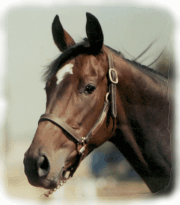|
|
A Horse,
of Course
with Don Blazer
|
 |
Well, it's a new
year, so it must be a new breeding season.
If it's a new breeding season, then I've got to plead again, "Please,
don't breed your mare, unless.....
1. She's worth breeding. (Of course you think she's worth breeding, but
she's not.)
Most mares are not worth breeding because they can't produce a foal which
will have dollar value. And if you think I am whistling Dixie in the dark,
just open your eyes and look around. Most weanlings and yearlings at sales
sell for less than the breeding fee, or the cost of keeping a mare for
a
year. They are money losers.
Check with your neighbors who have bred mares. They've still got the
foals because they couldn't sell them. They're complaining they are "horse
poor" because they are still feeding the last five foal crops. And
they
whine, "The market always seems to be weakest just when I want to
sell my
foals."
The fact is, there is no market for the foals of mares who have no proven
record. That covers the vast majority of mares, which probably includes
yours.
If your mare is worth breeding, then she has distinguished herself in
some
performance event, or her foals have already established themselves as
champions.
Now be honest, has the mare you are planning to breed actually been an
outstanding competitor, beating her competition time and time again? If
she has, great. Breed her and there will be a line of people waiting to
buy her foal at a fancy price.
2. You actually know what you are doing.
When you choose to breed a mare, be sure the resulting foal is going to
have strong market appeal. Know before you breed the mare there are people
(other than your family) who want that foal.
Unfortunately most people never consider what other horsemen want in a
foal. Instead of breeding to appeal to potential buyers, they breed their
mares trying to compensate for her weaknesses by choosing a stallion with
balancing strong points. There is no market for that foal. You are the
only one interested in him, so you are going to have him for a long time.
Whether you keep the foal or sell the foal, for the sake of the foal,
be
sure he or she is something with great market appeal.
3. You can afford to breed to a very good stallion.
Like begets like. If you breed to anything less than the best or the most
popular stallion you are going to get less than the best and a foal that
isn't popular. It costs money to breed to very good stallions, so be
prepared to pay the price. If the mare was worth breeding, the foal will
be worth having.
Don't try to be a genetics genius. You don't have to be. If your mare
is
worth breeding and you breed her to a very good stallion, or the most
popular stallion, the foal will have dollar value and there will be plenty
of people ready to purchase.
If the cost of breeding the mare is a consideration, the resulting foal
is
in trouble. You can't get a foal with dollar value breeding to an unproven
stallion, a poor performing stallion, a "free" stallion, or
the neighbor's
good ropin' horse.
But you say you don't care if anyone wants to buy the foal. You say you
aren't breeding to sell. You say you'll take care of the foal forever.
Sure, and I've got ocean front property in Arizona.
4. You have the acreage and the know-how to care for the foal.
Love conquers all, but even loved foals suffer when they grow up in small
pens, box stalls, or one-acre lots. Unless foals can run and play all
day
in big, big areas they are going to have troubles.
Protest all you want about how you are going to get the foal plenty of
exercise. The fact is, if you don't have the acreage, the foal is going
to
have conformational and physical problems; count on it.
Truly caring for a foal means not over feeding, not seeking rapid growth
rates, early and consistent hoof care, early and consistent behavior
discipline and a plan, not a dream, for the foal's future.
By now, of course, you are pleading with me to "mind my own business."
So I will. Good bye!
|

